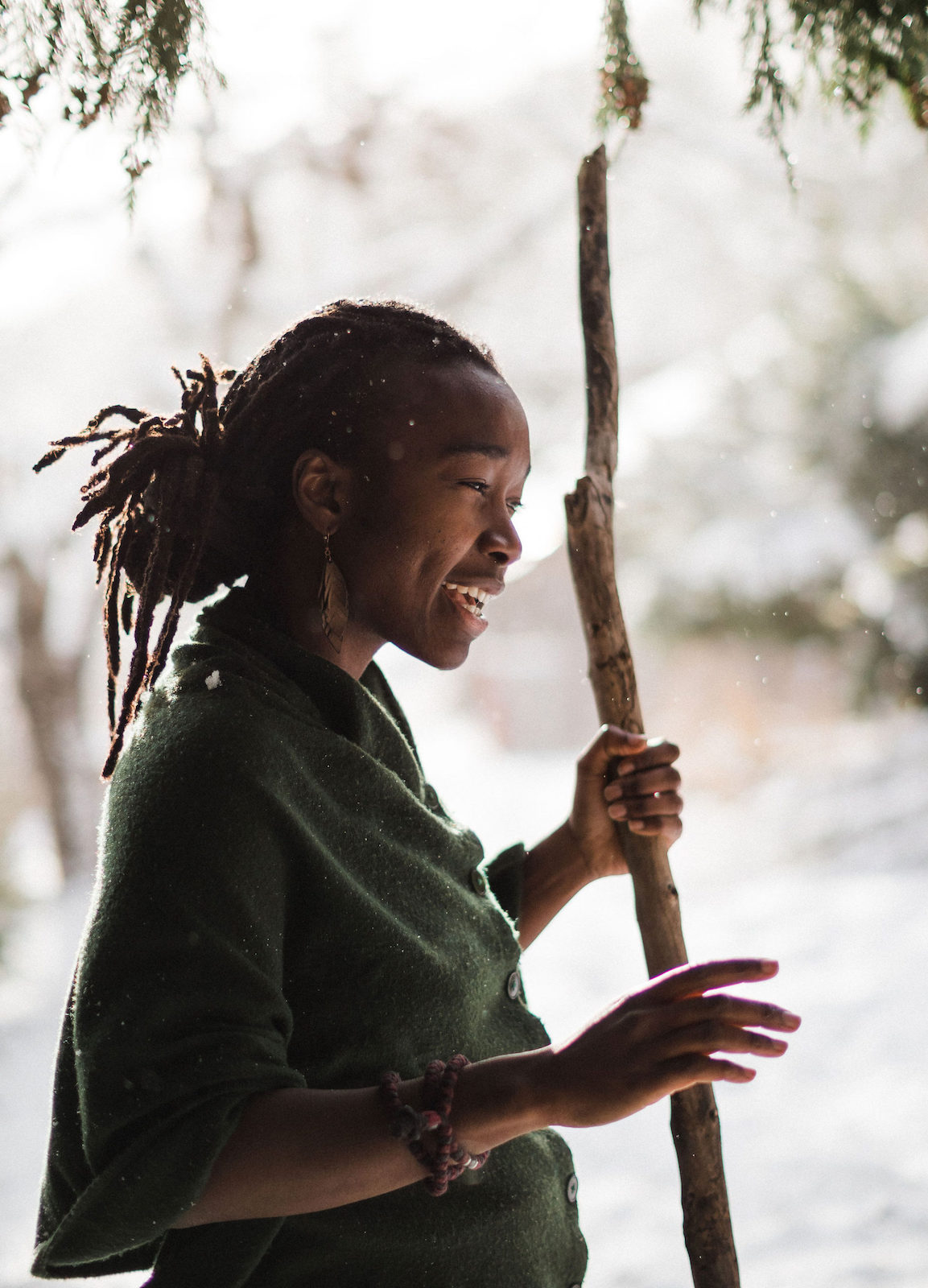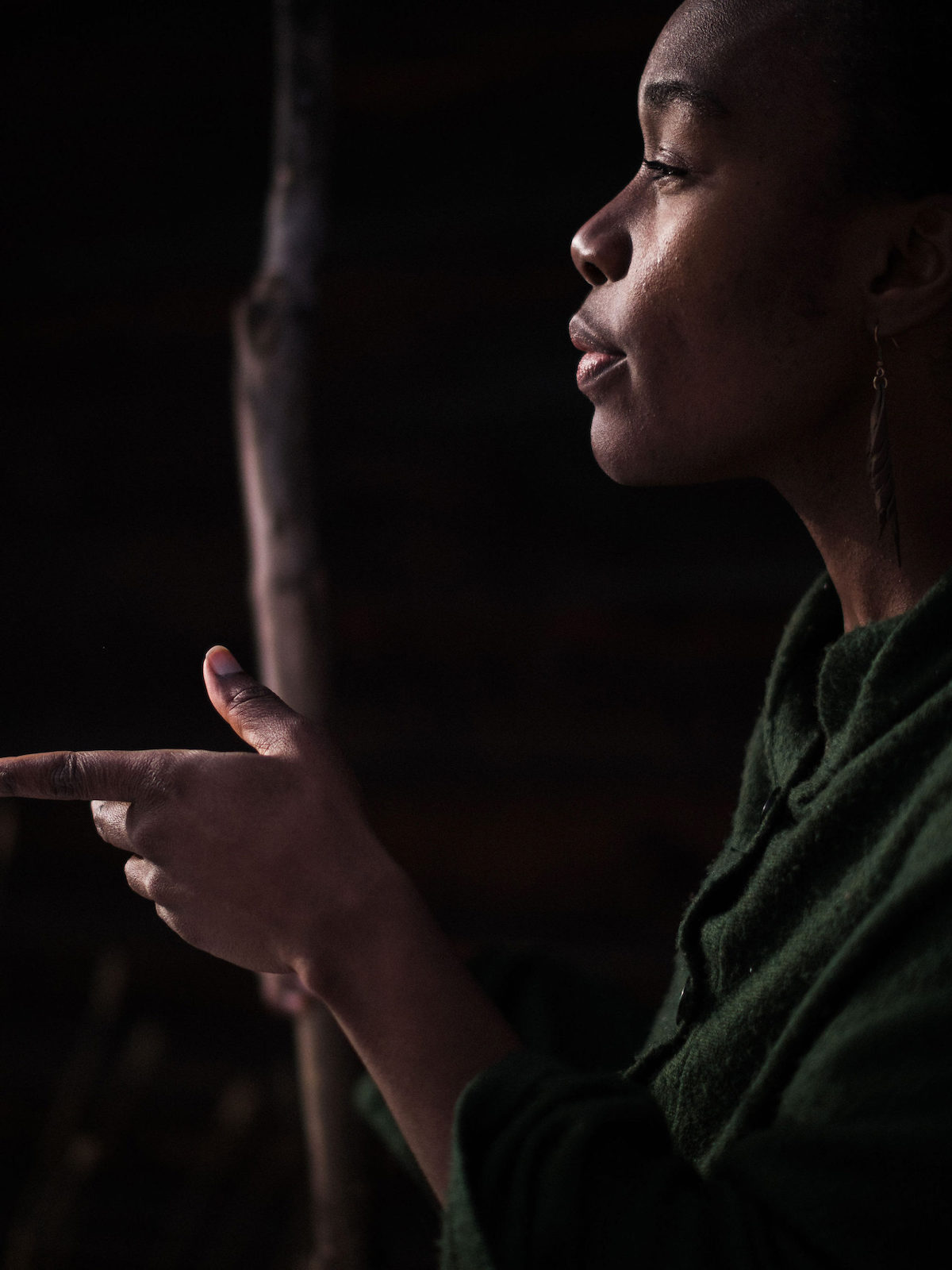When Shayna Jones came to Kaslo, British Columbia, the tiny town in the Kootenays felt like too much of a “booming metropolis,” despite having barely 1,000 residents. “It was a slow progression of moving to increasingly smaller places,” she says, describing her journey from Chicago to Vancouver, then to her current home just outside of Kaslo. Living in the B.C. woods, the actor and spoken-word artist has spent much time thinking about what it’s like to be a Black person in rural Canada. Her new one-person show, opening this week at Pacific Theatre, reflects on dozens of conversations she’s had with others like her across the country. In Vancouver for the world première of Black & Rural, she chatted with me in the theatre’s green room on a lunch break from rehearsals.
She enters the room silently, wearing a flowing black dress and a beatific smile, her face framed by long dreadlocks and giant gold-hoop earrings. Beaded bracelets climb up one wrist. Sinking into one of the mismatched couches, she tucks her bare feet beneath her and focuses intently on me. Before answering each question, she closes her eyes and thinks about how to respond, choosing every word carefully, occasionally going back to tweak her word choice.
“The land that I’m living on—the overwhelming reality of the natural world trumping the manmade world—I have come to recognize how essential that is for my own wellness and my own sense of connection to all kinds of things,” she says, speaking with the soft but commanding cadence of poetry. “And so why I live where I live runs very deep.”

Photo by Louis Bockner.
It was three years ago that Jones started to think deeply about the meaning of her choice of where to live. “My sweet little town, that I love, in 2020 held a Black Lives Matter rally in response to everything that was happening in the world,” she says. The rally stirred up a mix of emotions for her, and she describes “the inner dissonance I felt, being a lone Black representative in this sea of my well-meaning town’s members.” She yearned to connect to her ancestry and heritage “while not having a community of Black or African diasporic people to draw upon.”
She began to wonder, “Are there other Black folks tucked away in rural settings who are experiencing something similar? Why do they live where they live? What has drawn them there? What keeps them there? What is their sense of connection to their African heritage, or whatever their African diasporic heritage would be?” Jones decided to find out.
“I had 40 different conversations over an 18-month period with folks all over the country,” she says. “It was a slow process of people trickling in, but those who did step forward wanted to tell their story.” By video, she talked to Black people of all ages and genders about their experiences living in the countryside. “I didn’t have a political agenda,” she says. “I just wanted their soul-searching reflections.”
“Why I live where I live runs very deep.”
Several times, Jones experienced what she calls a “zinging resonance” upon hearing their stories. One woman likened her Black skin to a tapestry, “a weaving that was always telling a very heavy story.” Another mentioned a feeling of whiplash, “being so dark-skinned but trying to be palatable to a white community.”
There was one thing she asked each person: “What’s your gut response, your knee-jerk reaction, to the question, ‘What does it mean to you to be Black and rural?’” The responses ranged widely. “Sometimes beautiful, glowing words would come. And many times, gritty, bloody words would come.”
When I pose that same question to Jones, she makes several false starts before finally confessing, “Blood is the first word that comes to mind.” Closing her eyes, she thinks for several long moments, dissecting her own gut response, then explains, “I think blood meaning the grit and the bloodiness of just navigating humanity, but then also the pulse in my own blood, my blood lineage, my bloodline.”
One of the challenges Jones faced during the writing process was how to tell others’ stories without inadvertently identifying any individual storytellers. “If I say, ‘a Black person in this small town,’ it would not be very difficult to find out exactly who I’m talking about. It’s the nature of the beast.” Her solution was to draw upon “the expansive world of the poetic and the expansive world of the folkloric.” She says of her show, “It’s ended up being more of a meditation or a reflection on being so highly visible and yet easily overlooked, being seen and unseen, being witnessed and yet having no one to really witness you.”
Jones is keenly aware of the “stereotypical narratives about who belongs where and when and how and why.” She notes, “Black stories are often associated with urban settings in the popular media.” With Black & Rural, she hopes that white urban audiences “witnessing a Black-skinned, dreadlocked woman speaking about her life in the wilderness” will experience “the little bit of rewiring that does in the mind, and in the heart.” She adds, “I think this piece has ended up being an invitation to see one another more deeply.”
Ultimately, she says, “It made me sensitive to the quiet dignity of standing in one’s skin, of laying claim to one’s place on the Earth.”
Black & Rural runs March 31 to April 15 at Pacific Theatre. Read more local arts stories.









